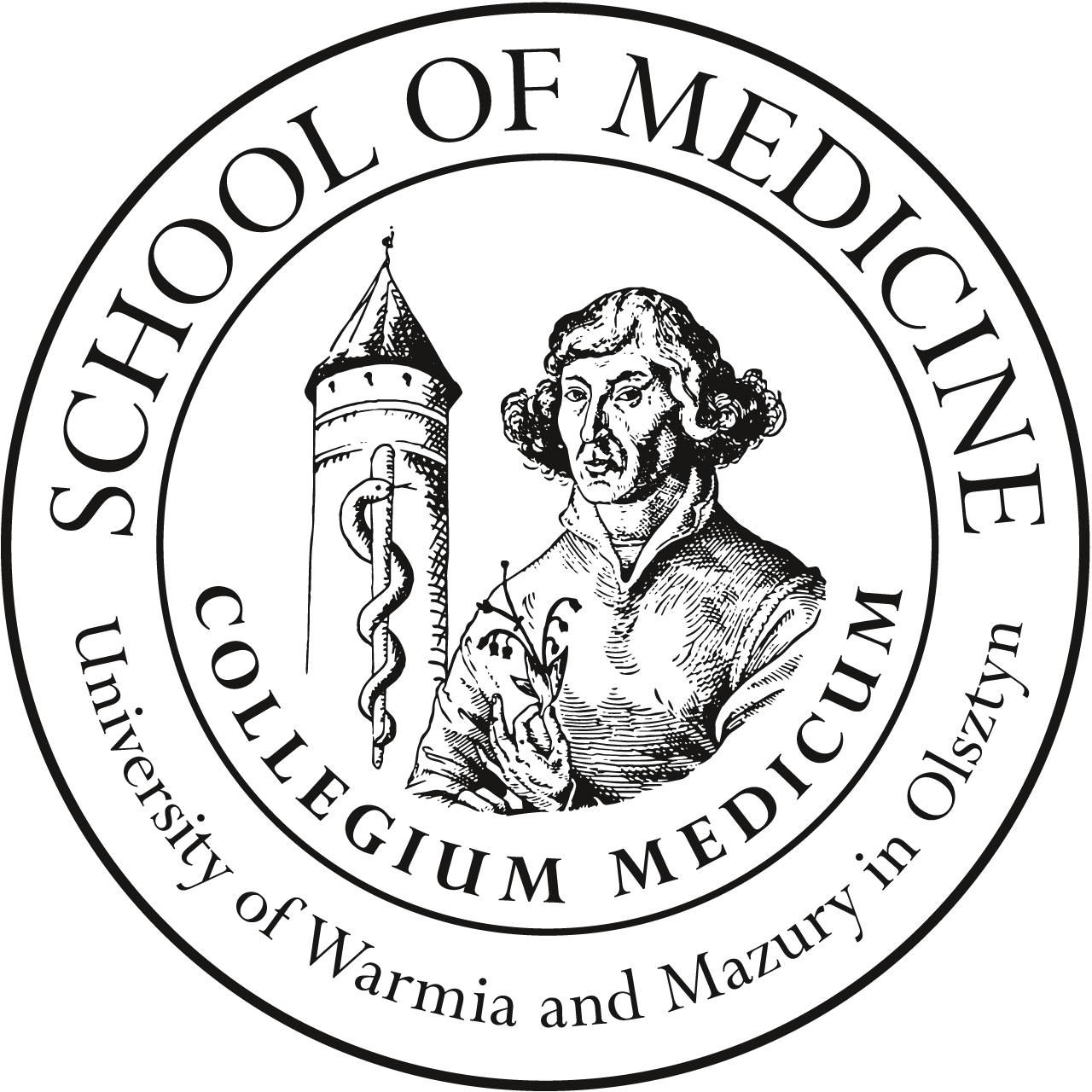REGULATIONS
RULES FOR OBTAINING A CREDIT FOR A SUBJECT OF PAEDIATRICS
FOR STUDENTS IN THE FACULTY OF MEDICINE
Coordinator: Elżbieta Jarocka-Cyrta MD, PhD, prof. UWM
YEAR III
All Students who take classes in paediatrics must apply BHP rules and RODO rules. The Student in the first class will be familiarized with the BHP and Rodo rules, which will be confirmed by signature.
I. CLOTHES
In the hospital premises, students are obliged to wear a white, clean, wrinkle-free coat and changed footwear (with light soles). Outerwear, bags and personal items should be left in the changing room. No jewellery can be worn on hands.
II. CLASSES
- Before the start of clinical classes, the student is obliged to read these terms and conditions.
- Teachers, places, times and class topic are held according to the framework and detailed programme of practical classes, with is on the website in the didactic tab.
- Students are obliged to participate in seminars, practical classes and lectures.
- The student is required to participate in the classes with his/her assigned group. To participate in classes with another group, the student must have a written approval of the Dean.
- During the course at bedside or clinical demonstration student is obliged to respect the rights of the patient, and in particular the right to privacy and respect for his dignity.
- Mobile phones, notebooks and audio equipment must not be used during the classes.
- It is forbidden to smoke, eat or drink in lecture halls or in the ward.
- It is forbidden to use telephones while writing tests as well as using notes and dowlands. Breaking the rules will result in failing classes.
PRACTICAL EXERCISES
The place where the practical classes will be held:
A. Provincial Specialist Children's Hospital in Olsztyn, Żołnierska 18a Street:
- Department of Paediatrics, Gastroenterology and Nutrition - Paediatric Ward II with Subdivision of Paediatric Nephrology and Cardiology;
Tutor: Natalia Galińska-Liss MD
- Clinical Department of Paediatric Oncology and Haematology;
Tutor: Tomasz Brzeski MD
- Department of Child Neurology with Subdivision of Neurogenetics and Rare Diseases;
Tutor: Elżbieta Łobodzińska-Młynarczyk MD; Aleksandra Łukasiewicz MD
- Department of Head and Neck Surgery for Children and Adolescents
Tutor: Krzysztof Dowgierd MD, PhD
- Clinical Department of Pathology and Congenital Defects of Newborns and Infants
Tutor: Anna Charemska MD; Małgorzata Szmyt MD; Aneta Szalacha MD
B. Classes are held in the classrooms of the Provincial Specialist Children's Hospital, in the rooms of the Department of Didactics and Medical Simulation of the Collegium Medicum with the Medical Simulation Centre (high fidelity rooms) or online:
Tutor:
- Prof. Sibylle Koletzko MD, PhD
- Prof. Jerzy Konstantynowicz MD, PhD
- Paweł Abramowicz MD, PhD
C. General rules for passing the paediatric course:
Attendance at classes is compulsory:
a) one excused absence from classes (one day) is allowed per semester for important reasons;
b) in the case of a longer justified absence (more than one class in a semester), a student shall be obliged to make up for the missed classes and seminars with another group and seminars with another group. For this purpose, a student should:
- present an appropriate excuse (e.g. a medical certificate) to the Department of Clinical Paediatrics within seven days after the end of the period of leave and obtain permission to make up the absence after making arrangements with the instructor of a given day with a designated classes group;
- obtain written confirmation of making up the classes and passing the applicable material. Confirmation shall be submitted to the Department of Clinical Paediatrics;
c) an unexcused absence from classes, seminars or lectures shall result in failing a semester;
d) for all classes, the student shall be familiar with the material from the current classes and from all preceding years of study;
e) during classes each day, there will be a test of preparation for classes (the material covers the topics of classes, seminars based on obligatory textbooks and lectures);
f) the test consists of five written questions or five test questions, and the student receives a grade for each test; Failing two tests shall result in failing the classes;
g) during each exercise, the student is also evaluated by the tutor (active participation in classes, preparation), for which he/she will receive a grade;
h) students who have an individual study arrangement are required to contact the course tutor in order to determine the arrangements for the course.
D. FORM OF ASSESSMENT OF CLASSES (EXERCISES, SEMINARS AND LECTURES
Credit for classes
a) the condition to pass the winter is attendance in all classes (one excused absence in one class per semester is allowed) and obtaining tests and oral answers (active participation in classes). The average of sub-grades obtained is the semester grade;
b) prerequisite for passing the summer semester and thus for being admitted to the final test, the result of which constitutes the grade for exercises and seminars in the summer semester, is attendance at all classes (one excused absence from one class per semester is permitted) and obtaining credit for tests, oral answers (active participation in exercises) and achieving 29 out of a possible 40 points in the Objective Structured Clinical Examination (OSCE) at two simulation stations.
c) students who have not completed the summer semester may be admitted to the final examination test on condition that they obtain credit from the Head of the Department of Paediatrics;
d) failure to pass will result in inadmissibility to the final test and repetition of year III;
e) pass grade for the paediatrics course in the summer semester:
- the form of the passing grade is a test consisting of 50 questions, the passing grade is from 71%- 36 points;
- a student who has not passed the test has the possibility of re-sit (the form of re-sit depends on the number of students who have not passed the test - orally or in writing);
- failure of the second deadline means a third deadline in the re-sit session;
- failing the third deadline means repeating the 3rd year;
- the grade for exercises and seminars of the 3th year paediatrics course in the summer semester is the result of the test according to the following scoring system:
≤ 35 points - unsatisfactory
36-38 points – satisfactory
39-41 points - satisfactory plus
42-44 points - good
45-47 points -good plus
48-50 points - very good
Credit for seminars
The student receives the same grade as in the classes.
Credit for lectures
a) the credit for the lecture is given on the basis of the attendance list for which the student receives a 'pass';
b) the student is required to attend lectures;
c) in the case of unexcused absences, the student will not be allowed to take the final assessment.


